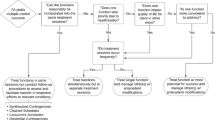Abstract
Contingency-based procedures have been found to be effective in facilitating delays to reinforcement for escape-maintained behavior within research and clinical contexts. Few studies have evaluated the use of these procedures for multiply maintained problem behavior. A contingency-based procedure was conducted with two participants to evaluate the effectiveness this procedure had on increasing tolerance to schedule thinning for problem behavior that was hypothesized to be multiply controlled. Results suggested that the procedure was effective at facilitating tolerance for a delay for both participants after switching to a lower effort task.


Similar content being viewed by others
References
Carr, E. G., & Durand, V. M. (1985). Reducing behavior problems through functional communication training. Journal of Applied Behavior Analysis, 18(2), 111–126. https://doi.org/10.1901/jaba.1985.18-111
Falcomata, T. S., Muething, C. S., Gainey, S., Hoffman, K., & Fragale, C. (2013). Further evaluations of functional communication training and chained schedules of reinforcement to treat multiple functions of challenging behavior. Behavior Modification, 37(6), 723–746. https://doi.org/10.1177/0145445513500785
Fisher, W. W., Thompson, R. H., Hagopian, L. P., Bowman, L. G., & Krug, A. (2000). Facilitating tolerance of delayed reinforcement during functional communication training. Behavior Modification, 24(1), 3–29. https://doi.org/10.1177/0145445500241001
Ghaemmaghami, M., Hanley, G. P., & Jessel, J. (2016). Contingencies promote delay tolerance. Journal of Applied Behavior Analysis, 49(3), 548–575. https://doi.org/10.1002/jaba.333
Hagopian, L. P., Boelter, E. W., & Jarmolowicz, D. P. (2011). Reinforcement schedule thinning following functional communication training: Review and recommendations. Behavior Analysis in Practice, 4(1), 4–16. https://doi.org/10.1007/BF03391770
Hanley, G. P. (2012). Functional assessment of problem behavior: Dispelling myths, overcoming implementation obstacles, and developing new lore. Behavior Analysis in Practice, 5(1), 54–72. https://doi.org/10.1007/BF03391818
Hanley, G. P., Jin, C. S., Vanselow, N. R., & Hanratty, L. A. (2014). Producing meaningful improvements in problem behavior of children with autism via synthesized analyses and treatments. Journal of Applied Behavior Analysis, 47(1), 16–36. https://doi.org/10.1002/jaba.106
Peić, D. & Hernández, V. (2016). Countee-Data collection system for behavioral data, Mobile application software, 2.2.1, mobile application software
Roane, T. S., Vollmer, T. R., Ringdahl, J. E., & Marcus, B. A. (1998). Evaluation of a brief stimulus preference assessment. Journal of Applied Behavior Analysis,31(4), 605–620. https://doi.org/10.1901/jaba.1998.31-605
Sidener, T. M., Shabani, D. B., Carr, J. E., & Roland, J. P. (2006). An evaluation of strategies to maintain mands at practical levels. Research in Developmental Disabilities, 27(6), 632–644. https://doi.org/10.1016/j.ridd.2005.08.002
Wacker, D. P., Harding, J. W., Berg, W. K., Lee, J. F., Schieltz, K. M., Padilla, Y. C., Nevin, J. A., & Shahan, T. A. (2011). An evaluation of persistence of treatment effects during long-term treatment of destructive behavior. Journal of the Experimental Analysis of Behavior, 96(2), 261–282. https://doi.org/10.1901/jeab.2011.96-261
Code availability
Not applicable.
Funding
Not applicable.
Author information
Authors and Affiliations
Corresponding author
Ethics declarations
Conflict of interest
Karla A. Zabala declares that she has no conflict of interest. Kara L. Wunderlich declares that she has no conflict of interest.
Ethical approval
All procedures performed in the study involving human participants were in accordance with the ethical standards of the University of Georgia and with the 1964 Helsinki declaration and its later amendments or comparable ethical standards.
Informed consent
Informed consent was obtained from all individual participants included in the study.
Additional information
Publisher’s Note
Springer Nature remains neutral with regard to jurisdictional claims in published maps and institutional affiliations.
Research Highlights
• Contingency-based procedures were conducted with individuals with hypothesized multiply maintained problem behavior.
• Procedures were implemented in clinical and school settings.
• Higher effort tasks were ineffective at reducing problem behavior among participants.
• Low-effort tasks were effective at reducing problem behavior, suggesting that researchers should begin their interventions with low and simple task requirements.
Rights and permissions
About this article
Cite this article
Zabala, K.A., Wunderlich, K.L. The Use of Contingency-Based Procedures to Promote Tolerance of Schedule Thinning for Hypothesized Multiply Maintained Problem Behavior. Behav Analysis Practice 15, 312–317 (2022). https://doi.org/10.1007/s40617-021-00646-9
Accepted:
Published:
Issue Date:
DOI: https://doi.org/10.1007/s40617-021-00646-9




